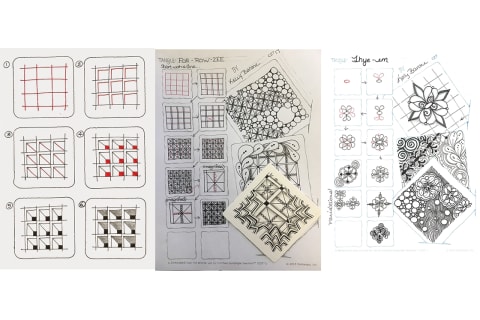How To Get Started Doing Zentangle (& Why You Want To), From An Expert

If you've ever used an adult coloring book, you're probably familiar with the mesmerizing patterns of Zentangle. This style of drawing may seem intimidating at first glance, but it's actually much simpler than it looks. Read on to find out about the benefits of the Zentangle plus how to get started, from a Zentangle teacher.
What is the Zentangle method?
At first glance, Zentangle art might look like doodles on steroids. But as certified Zentangle teacher Kelly Barone tells mbg, doodling is mindless, while Zentangle is mindful.
"It's a method of using repetitive patterns in a mindful way," she explains. "I always call it the art of stress reduction and relaxation. And anyone can do it."
Created by Rick Robert and Maria Thomas, Zentangle is all about creating patterns (aka "tangles") with simple dots, lines, curves, orbs, etc. The design is created on a small piece of paper or "tile," which can also be arranged with other tiles to form larger mosaic-like designs.
How it works as artistic meditation.
Zentangle effectively couples many of the benefits of art and meditation by allowing you to concentrate your awareness, quiet your mental chatter, and get into a creative state. Read on to learn more about the benefits of this soothing art form.
Benefits of the practice:
It's therapeutic.
First and foremost, don't underestimate the therapeutic effects of making art—especially using a mindful technique like Zentangle. As Barone tells mbg, she's seen it help people of all walks of life find peace and calm.
It improves focus & concentration.
When you're focusing on the design you're drawing, you're homing in on your own concentration and awareness. The more you train your mind to hold your attention on something, the easier that mindful focus becomes. Anecdotally, Barone notes she's helped students use Zentangle as a precursor to their study, adding, "They found that if they took a couple of minutes and did a bit of tangling in preparation of their studying, they would often score better on tests."
Channels emotion.
Have you ever noticed your handwriting looks different if you're in a good mood versus a bad mood? According to Barone, this can be seen in Zentangle as well because the technique helps us channel emotions. "If I look at my drawings, I can tell what kind of mood I was in just by the way the art looks," she explains.
For example, when stressed, Barone says her tangles are smaller, with more rigid and pointy shapes. And when she's in a good mood, her tangles are more rounded, flowy, and organic-looking.
It's accessible in more ways than one.
Short on time? Don't have the funds for a bunch of fancy art supplies? In either case, Zentangle is a great option to try if you're looking to get creative. Barone explains that it's designed to be portable, simply requiring your small "tile" and something to draw with.
And since tiles are typically pretty small, you'd be amazed how quickly you can fill it up when you only have a few minutes. "Even if you only have three minutes to sit and do it, it still will have benefits," Barone adds.
It's simply fun & intuitive.
And lastly, any art form has the benefit of being fun and intuitive. As artist and author of The Art of Aliveness Flora Bowley previously told mbg, "Creative practices give us the opportunity to tune into our intuition and aliveness, loosen our grip on perfection and overthinking, and move from a place of experimentation, presence, and play."
How to try it.

If you're curious to try Zentangle for yourself, the good news is it couldn't be easier to get started. All you need is a small piece of paper and a pen or pencil. (Or marker, colored pencil, etc.—whatever you like to draw with!)
Barone tells mbg that she does recommend taking a class in person your first time if possible, and you can conveniently find certified Zentangle teachers near you in the directory of Zentangle instructors. If that's not an option, there are plenty of guided videos online that demonstrate how to do certain patterns. Or maybe you opt for an instructional book on how to draw them.
Whichever route you opt for, Barone explains that all Zentangle patterns are made up of five basic shapes with slight variations: dots, lines, orbs (or circles), C shapes, and S shapes. (Take a look at the photos above, provided by Barone, for a sense of what these can look like, plus a few deconstructed patterns you can try for yourself.)
From there, your tile is your oyster, and you can let yourself have fun and relax while creating all sorts of patterns.
The bottom line.
Whether you're looking to flex your creativity, quiet your mind, or even channel your emotions, Zentangle is a beautiful art form you don't want to skip. So give that adult coloring book a companion and start drawing today.

Sarah Regan is a Spirituality & Relationships Editor, a registered yoga instructor, and an avid astrologer and tarot reader. She received her bachelor's in broadcasting and mass communication from State University of New York at Oswego, and lives in Buffalo, New York.